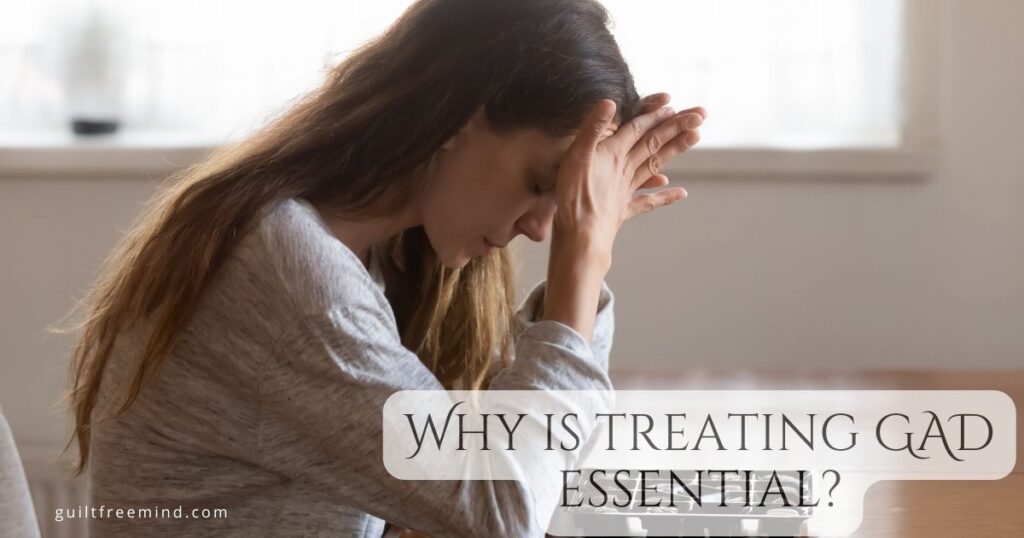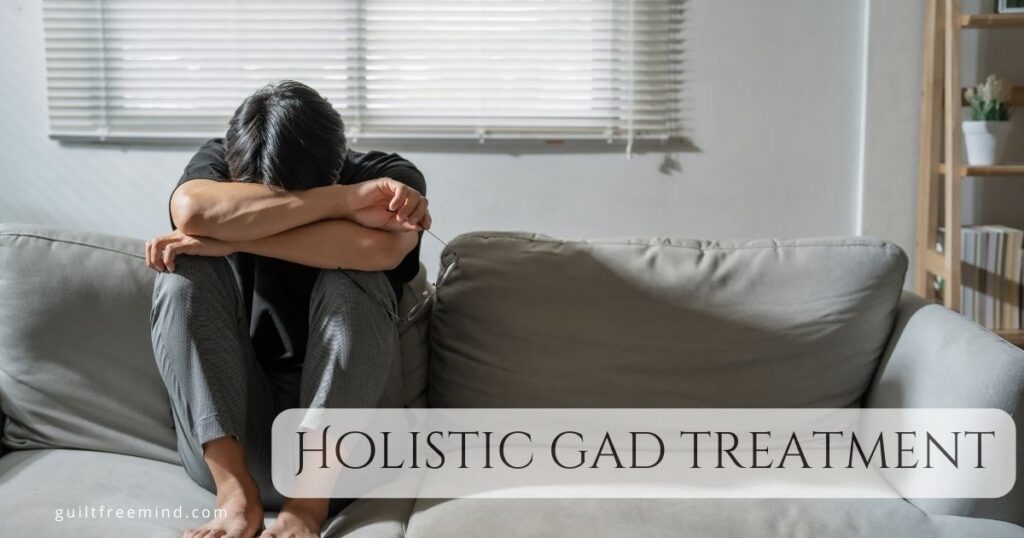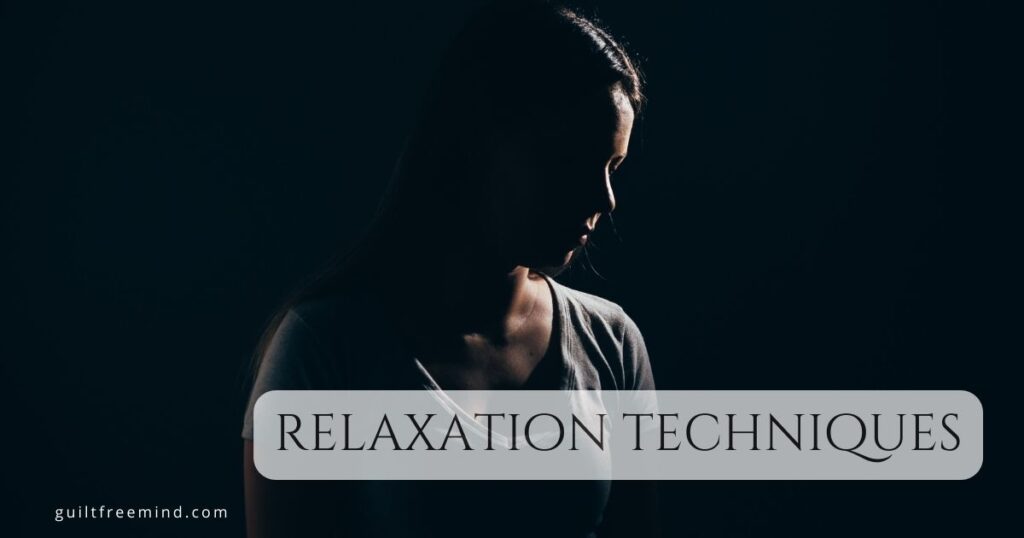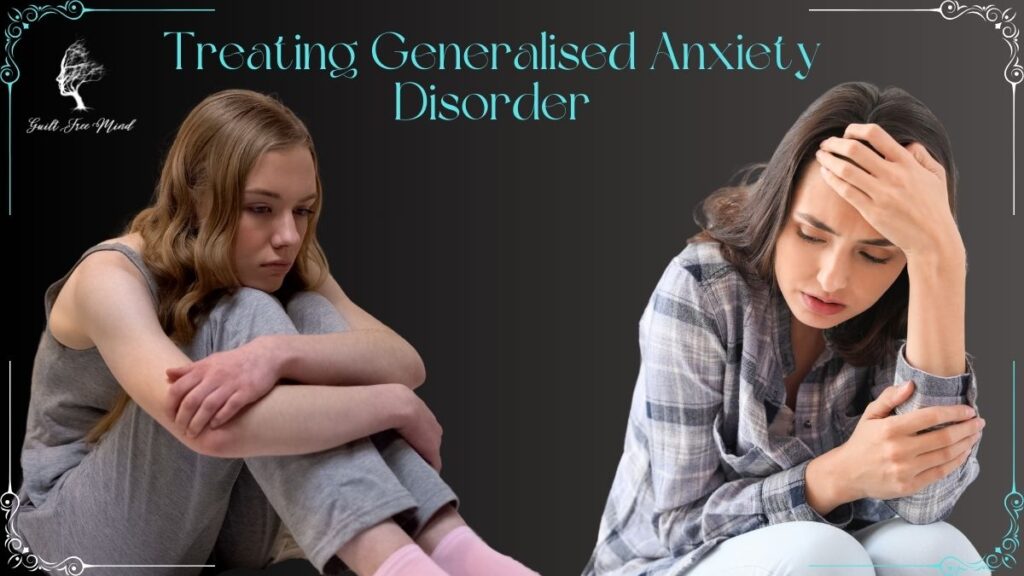Living in a world where you don’t experience anxiety is an impossible situation. Most of us go through some form of anxiety at some point in our lives. It is a part and parcel of handling stress regularly. However, some forms of anxiety can be more debilitating than others. One of these is the generalized anxiety disorder (GAD). GAD is a pretty pervasive and common mental health condition that is characterized by the presence of constant and excess worry over every aspect of one’s life; whether this aspect can be controlled or not. Those who suffer from generalized anxiety disorder experience apprehension and anxiety that extends beyond specific events or situations. The necessity of treating generalized anxiety disorder becomes crucial when the disproportionate and unnecessary worry starts to hurt the person’s daily life.
Table of Contents
Why is treating generalized anxiety disorder essential?
The reason treating generalized anxiety disorder is a necessity is because it can be extremely challenging for the person to gain control over their anxious thoughts. The constant barrage of anxious thoughts leads to high levels of stress, restlessness, and tension. The things that people worry about in the case of GAD can vary from finances, health, and work to everyday matters like whether they locked their house or not to relationships. Unlike the case of normal anxiety, in the case of GAD, a constant undercurrent of anxiety and worry persists in the individual even if there is no real reason to be concerned about.
Even though generalized anxiety disorder is a chronic condition, the symptoms are most often manageable. The most common treatment options for generalized anxiety disorders are medication, changes in lifestyle, and proper therapeutic intervention. Understanding the signs, symptoms, and treatment options for GAD will help individuals, their families, and even healthcare professionals to address this mental health issue quickly and comprehensively. If you feel that your loved one is suffering from generalized anxiety disorder, seek professional help as soon as possible.
If you wish to lead a more positive life, subscribe to Guilt Free Mind. The subscription option is present in the sidebar. If you like watching videos, subscribe to the YouTube channel of Guilt Free Mind. Remember to ring the notification bell so that YouTube does not miss out on notifying you regarding any new video releases.

Understanding Generalized Anxiety: the symptoms
Before I dive into the different methods of treating generalized anxiety disorder, you need to understand the signs and symptoms of the same. Generalized anxiety disorder is most often identified by the presence of an excessive and persistent worry that tends to extend beyond the general symptoms of anxiety. The most common symptoms of generalized anxiety disorder are:
The most common symptoms of generalized anxiety disorder
- Disproportionate and excessive worry about every aspect of their life.
- A constant feeling of being on edge or keyed up.
- Physical manifestation of symptoms like discomfort or muscle tightness.
- A constant feeling of tiredness, even after plenty of rest.
- Easily becoming irritated or agitated.
- High difficulty in falling asleep or staying asleep.
- Experiencing constant restless sleep.
- Such people also have a challenging time focusing on any particular work.
- Mind going blank due to constant and excess worry.
Contributing factors and triggers regarding generalized anxiety disorder
- This condition is more likely to occur if the person has a family history of mental illnesses or anxiety disorders.
- Changes in the level of crucial neurotransmitters like norepinephrine and serotonin
- People with anxiety-inducing personality traits like the tendency to get overwhelmed, perfectionism, and excess worry have a higher chance of developing GAD.
- The presence of chronic physical illnesses can boost the risk for GAD.
- Significant life changes like trauma or stress can heighten this condition.

Understanding the difference between GAD and Normal Anxiety
Generalized anxiety disorders differ from normal anxiety in many ways. The difference lies in duration, impact, and intensity. Feeling anxious is a normal circumstance before high-importance and significant events. However, those with GAD experience a constant and pervasive worry over different aspects of their life. This worry exists without a valid cause. A case of normal anxiety generally tends to be short-lived, and the intensity depends on the situation at hand.
On the other hand, those suffering from GAD feel a chronic and high worry level that can excessively disrupt their physical and mental well-being.
Professional interventions for treating Generalized Anxiety Disorder
One of the best ways to treat generalized anxiety disorder is to involve help from mental health professionals like counselors, psychologists, and psychiatrists. They can be pivotal to helping you navigate through the tumultuous waters of anxiety and its symptoms. Professionals in this field, equipped with the knowledge, have seen many cases like yours and can provide you with a supportive and non-judgemental environment to help you understand the causes behind your problem. The most common therapeutic intervention in this case involves skill building, developing coping strategies, and finally working on the underlying and deep-rooted thought patterns that contribute toward anxiety
Cognitive behavioral therapy
One of the most common treatments for treating generalized anxiety disorder is cognitive behavioral therapy (CBT). The key components that make up cognitive behavioral therapy for treating generalized anxiety disorders are:
Identifying negative thought patterns
The first step of CBT is to identify the negative thought patterns that are fueling anxiety in the person. The therapist works with the individual to help identify the irrational thoughts that are the reason behind the anxiety of the person. The therapist guides the individual through analysis, self-reflection, and instruction, enabling them to replace their negative thoughts with more balanced and realistic ones.

Development of coping mechanisms
Along with helping the individuals cope with the intrusive thoughts that contribute to anxiety, the therapist also helps the individual develop practical methods to cope with anxiety. The coping mechanisms are usually tailored depending on the specific individual. These practices may include mindfulness practices, relaxation methods, and finally behavioral strategies that may allow them to respond differently towards stressors.
Opting for medication
One of the crucial components of treating generalized Anxiety Disorders is to opt for medications. If self-help methods and counseling are not helping the person or if a bit of boost is needed, the therapist may choose to opt for medication. Medication is also an option in case the person has a suicide risk. The most common medications that are used for the treatment of generalized anxiety disorders are:-
Antidepressants
The first on the list of medications is antidepressants. Selective serotonin reuptake inhibitors or SSRIs and serotonin-norepinephrine reuptake inhibitors (SNRIs) are most often prescribed by therapists in case the individual is suffering from a case of severe anxiety. These can be of huge help in regulating the neurotransmitter level and the alleviation of the symptoms.
Benzodiazepines
If short-term relief is needed, then benzodiazepines are used. These medications are used to provide quick relief in the case of those who are suffering from acute anxiety. There is one problem with benzodiazepines. These can cause dependency. Thus, mental health professionals do not recommend these medicines on a long-term basis for any individual.
Buspirone
Another class of drugs commonly prescribed for the option of treating generalized anxiety disorders is buspirone. This is a class of anti-anxiety medication that most often works on the dopamine and serotonin levels.
In most cases, for treating generalized anxiety disorders, medications are not used alone. Along with medications, therapy is also used to provide a combinatorial benefit. The choice of medication and therapeutic technique depends on the needs of the individual and the severity of their symptoms. Another factor that dictates the choice is the medical history of the person. Regular communication between the healthcare provider and the individual is crucial for monitoring the effectiveness of the therapeutic strategy and handling the probable side effects.
Lifestyle modifications for treating generalized anxiety disorder
How you lead your life can have a huge effect on why an individual can get affected by generalized anxiety disorder. Factors like sleep, diet, stress, etc. have a huge role in boosting anxiety in a person. Therefore, these factors must be considered when one looks into the option of treating generalized anxiety disorders. Here are some tips on how to have a better life and deal with anxiety easily:

Sleep tips
Managing quality sleep is the first step in treating generalized anxiety disorders. Studies have shown that lack of proper sleep can contribute to exacerbation of anxiety in the person. Therefore adopting good sleep practices can be intensely beneficial in combating generalized anxiety disorders.
- Have a consistent sleep schedule. Ensure that you go to bed at the same time and wake up at the same time daily.
- Ensure that your sleep area is comfortable. It should be cool, quiet, and dark.
- Limit your exposure to screens before bedtime to reduce the impact of blue light.
- Form a sleep routine. Start with reading a book, a warm bath, or work on relaxation so your mind is ready to rest.
Balance personal life and work
The absence of work and personal life can be a huge contributor to generalized anxiety disorders. Therefore, the establishment of a proper work-life balance is compulsory for your mental well-being. there are some tips to help you establish a good work-life balance.
- Clearly define your work and family time. Do not work when it’s your family time.
- Take regular breaks in between your work. This helps to refresh your mind and boost your productivity
- Establish a proper self-care schedule so you have some time to yourself regularly.
Set realistic expectations and goals for treating generalized anxiety disorder
Those who are perfectionists face high levels of anxiety because they are constantly worried about committing mistakes, not being good enough or others not liking their work. Here are some ways you can make sure you have realistic expectations and goals:
- Break down larger tasks into smaller manageable sections. This reduces the feeling of overwhelm.
- Celebrate every small and big win.
- Recognize that running behind perfection is not a good trait. It only leads to burnout. Instead, focus on realistic expectations.
Holistically treating generalized anxiety disorders
Incorporate meditation and mindfulness
Mindfulness-based stress reduction
Mindfulness is the first step towards boosting focus, and productivity and reducing your stress levels. When you boost your mindful behavior, you develop present-moment awareness. This helps boost your focus on the task at hand. As a result, you not only finish your task soon, but you also learn to dissociate yourself from stressors. Many mindful techniques can be used like body scans, mindful breathing, and finally mindful observation. These methods can help you ground yourself in the present and not focus m incidents from the past or those likely to occur in the future. This reduces the chances & unnecessary rumination and excess worry.

Guided meditation
Guided meditation can be led by a professional or via the use of audio-video resources. Another method of engaging in guided meditation is via the use of meditation apps like Calm and Headspace which have many different varieties of meditations in them. These sessions often focus on techniques of visualization, relaxation, and body movement, and promote feelings of inner peace and calmness. This is what makes them an extremely valuable tool for treating generalized anxiety disorder.
Exercise
The next in the list of methods for treating generalized anxiety disorder is exercise. Studies have time and time again shown that exercise has a huge positive impact on those who suffer from anxiety, including generalized anxiety disorder. When you engage in exercise, your body releases endorphins. Endorphins are your body’s natural mood boosters. They not only boost your mood, but they also help reduce the stress hormone, cortisol levels.
To incorporate the benefits of exercise in treating generalized anxiety disorders, include yoga, jogging one even regular walks in your every schedule. These can make a huge contribution to your well-being and act as a tool to help you manage your anxiety.
Changes in diet and nutritional support
As mentioned before, dietary factors can have a huge impact on your mental health. A few dietary changes can have a massive effect on handling generalized anxiety disorder. This can act as a complementary treatment for your anxiety.
- Focus on eating a well-balanced diet containing good levels of vitamins, minerals, and a healthy dose of omega-3 fatty acids. These elements boost overall mental health.
- Reduce stimulant intake like sugar and caffeine. This cautionary step on your part can help stabilize your energy and mood levels and help in reducing symptoms of generalized anxiety disorder.
- Hydration is crucial for emotional well-being and boosting cognitive function.

Self-help strategies
Journaling
As I have mentioned many times before, journaling is one of the most influential and yet- underrated tools in the arsenal of mental health tools. It is an amazing medium for self-reflection and emotional expression. This is especially crucial for those who are dealing with generalized anxiety disorder
Engage in daily reflection. Take a few minutes out every day and write down your experiences, feelings, and thoughts. This will help you gain an insight into the patterns and triggers for anxiety.
Always write down everything you feel thankful for. Changing your focus from what bothers you to what you are grateful for can boost a positive mindset.
Build your support network
Having a shooing network of people you can rely on in your times of need can be of critical help in treating generalized anxiety disorders. Here are a few ways how your family, friends, or anxiety support network can be of help to you:
- Share your feelings and experiences with your trusted family members, friends or support folks.
- If you need help, do not hesitate to reach out to mental health professionals for support and guidance
Make relaxation techniques part of everyday life
Focus on slow and deep breathing to activate the body’s relaxation response. Use methods like diaphragmatic breathing to provide instant relief.
Use progressive muscle relaxation techniques to systematically tense up and release the muscles to reduce the overall tension in your body and boost the relaxation of your muscles.
Add meditation and mindful sessions to your daily routine. Use apps and guided meditation sessions for this.

Get technological help
Online therapy
Many counselors conduct their therapy online. The way you can attend your therapy session from anywhere in the world. You can also engage in therapy sessions from the comfort of your couch. Furthermore, this method removes the time you waste traveling to the therapist’s office.
The therapy can be done via video call sessions. Teletherapy on telehealth provides such people with the option to reach licensed therapists from home and get counseling without delay.
Some counselors also provide their services by chat-based methods. This provides the individual the flexibility to opt for written communication,
Apps for mental health
There are a variety of free and paid mental health apps like Calm, headspace, and others that can remind you to do a mental health check-in and also arm you with relaxation exercises,
- Track your mood with mood-tracking apps so you can identify patterns and triggers leading to anxiety.
- Certain apps can also connect you to licensed therapists. This arms you with a convenient alternative to traditional therapy options.
Virtual support options
Another option is using platforms like Facebook groups on Reddit communities where people connect, provide encouragement, and share advice on what worked for them.
You can also opt for online support groups that are hosted by mental health professionals which allow people to opt for group therapy sessions from anywhere in this world.

Conclusion
Generalized anxiety disorder is a multifaced anxiety disorder that has arisen from a variety of root causes. There is no one way to start treating generalized anxiety disorders. The first step in addressing this issue to to recognize the need for help, reach out, and start working on yourself. An effective treatment plan for addressing generalized anxiety disorder is understanding the symptoms, getting good professional intervention and finally working on incorporating holistic and various self-help methods.
whether the professional intervention involves counseling, medication, or a combination of the two, has a huge role in providing support and guidance. CBT is being used as a valuable tool to help the individual identify and challenge the negative thoughts and reframe them towards more positive ones.
For self-help, individuals should focus on actively participating in the betterment of their mental health. some of the tips that should be employed for this are building a proper support group, adding in techniques as part of a person’s everyday life, and finally, working on developing self-coping strategies so you can manage your anxiety regularly.
If you have any queries about this blog post or any other on Guilt Free Mind, feel free to put them in the comment section. If you wish to lead a more positive and productive life, subscribe to the Guilt-Free Mind newsletter. The subscription option is present in the sidebar. If you like watching videos, subscribe to the Guilt Free Mind YouTube channel. Remember to ring the notification bell and set it to ALL so that YouTube never misses to notify you about any new video releases.
See you in my next blog post
Dr. Shruti
Frequently Asked Questions
The most common symptoms of generalized anxiety disorder are persistent and excessive worry about one’s different aspects of life. They are in a constant state of worry regarding everything in their life. The most common symptoms are fatigue, muscle tension, restlessness, difficulty focusing and sleep are eating disturbances.
The diagnosis of generalized anxiety disorder is done depending on the criteria mentioned in the Diagnostics and Statistical Manual of Mental Disorders (DSM-5). Healthcare professionals most often will assess the impact and duration of the worry period that the person is going through along with all the other symptoms to identify if the traits of GAD are being fulfilled.
Generalized anxiety disorder treatment most often involves a combination of medication and therapy. One of the behavior modification techniques used in the case of generalized anxiety disorder is cognitive behavioral therapy (CBT along with medications to help manage the symptoms based on severity.
Lifestyle modification is one of the crucial parts of treating generalized anxiety disorder. Maintaining proper sleep duration, going to bed and waking up at the same time consistently every day, eating well, and managing stress via relaxation are crucial to better manage symptoms.
Many technology-assisted therapies like mental health apps, online therapy, and virtual support communities can be extremely helpful in managing GAD. They can provide you with resources, accessibility, and convenience and easily complement traditional forms of treatments.
